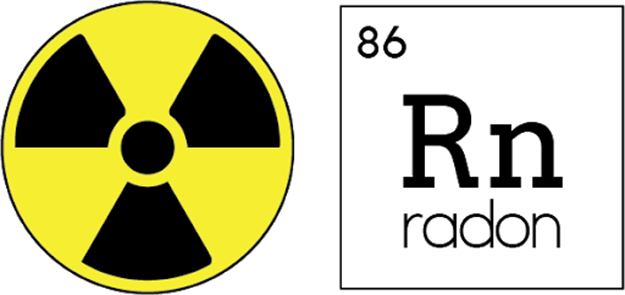
13 Oct, 2023/ by Surveyor Local /News
When you are buying a house and you are considering appointing a surveyor to check out the structural stability and general state of the property, there are several things that people talk about or that you might fear being found in any investigation.
Subsidence is a key one, as is wood rot in key places, and then on evidence of flooding, electrical system problems, roof issues and so on.
But one of the questions that might be puzzling is whether your planned purchase is in a radon gas hotspot.
What is radon gas?
Essentially, radon is an odourless and colourless gas (that also appears in its own right on the periodic table) that is also radioactive.
It is formed by the radioactive decay of small particles of uranium that exist naturally in the soil and some rocks.
It's a health hazard in large quantities because, as with any radioactive particles that decay, radiation is emitted as part of the process. And any exposure to this radioactive deterioration is deleterious to health, with the principal result being a variety forms of cancer - and, with radon being a gas, it can cause problems from the soil and rocks in which a house is built.
This is why an assessment of the levels of radon is an important part of the homebuying process.
Identifying the risk of radon gas existence
The UK Health Security Agency keeps a regular update on where radon is particularly prevalent in the country. You can use their interactive maps (the darker the colour on the map, the higher the instances of radon in that area) to establish the potential level of risk of buying a house in the area you've opted to explore for a purchase.
The only way to be sure about the level of radon gas at a property is for it to be tested. This is something that you can do yourself outside of the home purchase process.
However, your surveyor, if they are local, might be aware of the general risk, and can advise of problematic areas in the property (such as blocked air bricks and other structural issues that allow the gas to build up underneath the building).
Your Conveyancing Solicitor may also be aware of the risk level created by the high existence of radon gas and recommend that you get a test performed - you might consider asking the vendor to contribute or to pay for it. The UK Health Security Agency states that a Radon Risk Report costs £3.90 (including VAT), the results of which will confirm if the home is a radon-affected area.
If those results show that the building is in such an area, then the recommendation is for the radon to be measured, which costs £52.80 (including VAT), as of 1 November 2023.Answer
Taking action to reduce radon gas
There are various methods of reducing radon gas if it is prevalent in the building.
Some people think that sealing floors completely will resolve the problem - however, without the air flow, this method is liable to lead to some rotting of the wooden floors and joists, and is generally not recommended.
The UK Health Security Agency advises that the best ways of reducing and managing radon gas emissions comes from one (or more) of the following:
- A radon sump - essentially a fan that draws away the gas and the most effective method
- Positive ventilation - a fan blowing fresh air into the building, usually located in the roof-space
- Natural under-floor ventilation - best for suspended floors with a good space beneath them
- Active under-floor ventilation - use of a fan to blow air into or extract air out of the space
- Management of cellars and basements
Your first step should be to seek an assessment of the risk of radon in the area and take the remedial steps from there.
Both your surveyor and conveyancer can provide guidance on the next steps to take if you have any concerns.
And one of the chief pieces of vendor documentation is an up-to-date radon gas measurement certificate. Ask your conveyancer and surveyor if they have seen evidence of the certificate before going any further.
The right surveyor for your needs
You are no doubt looking for a quality assessment of your potential new home, but keeping costs as low as possible.
And that's where it is really worth contacting Surveyor Local!
Not only will the surveyor work hard to find all the problems affecting the property, they will also be keen to adopt new and proven technology in order to give the best survey possible.
Surveyor Local will provide a quote that will not change - what you are quoted is what you pay.
You'll get one of over 100 fully-qualified RICS surveyors, who is local to the property you are buying so they will know the area and bring that knowledge to their assessment and their analysis of the issues with the new home.
Next-day bookings are usually available, and your appointed surveyor will look after arranging access to the property with the estate agent and the seller. Once the survey is complete, they will send you a PDF copy of the report by email.
Call to get your survey quote started, or to discuss your concerns with the acquisition of your planned property.
Or you can get a quick quote, using Surveyor Local's easy-to-use quote generator. Simply input your name, postcode, email address, phone number and an approximate value of the property (usually the agreed price), and we'll give you an instant quote for the work (with an email copy).
We'll do the rest once you confirm your acceptance of the quote.
